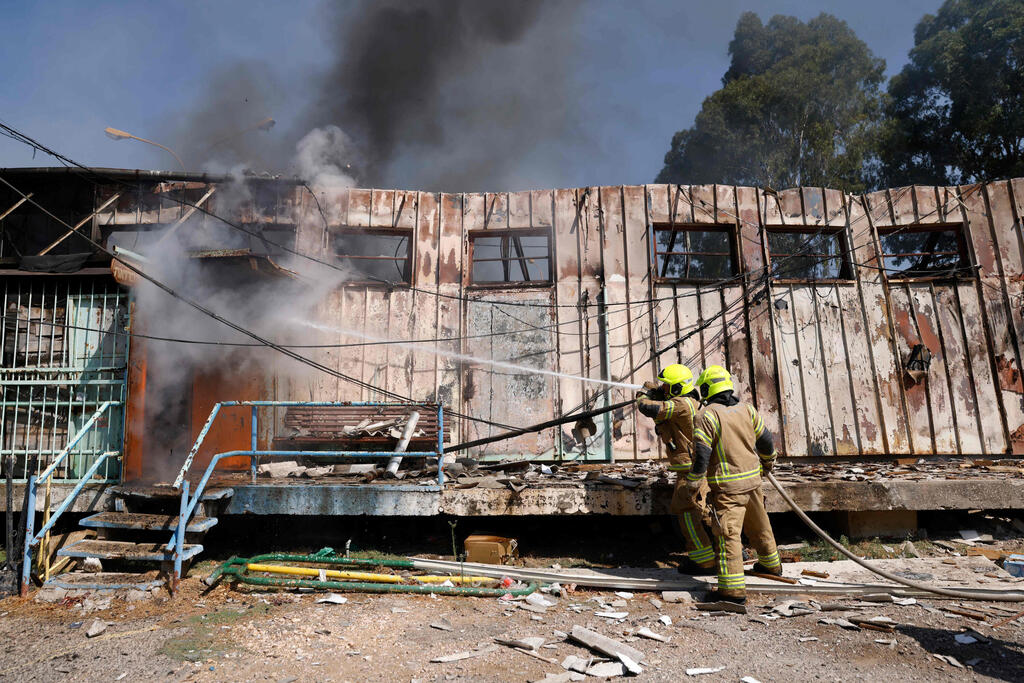Getting your Trinity Audio player ready...
Amid Prime Minister Benjamin Netanyahu's approval to hold talks with the U.S. about a temporary halt to strikes in Lebanon for cease-fire negotiations, northern border community leaders are expressing concern. They refuse to accept any "exit points" for Hezbollah that might allow the terror organization to regroup. Instead, they have put their hopes on IDF Chief of Staff Herzi Halevi, who has stated that the IDF is ready to enter Lebanon to dismantle terrorist infrastructure, a fundamental condition for ensuring the safe return of northern residents.
Hezbollah rockets strikes have damaged over half of the homes in Metula. Despite military assurances, Metula Mayor David Azoulay remains troubled by statements from "political sources" in Netanyahu's office.
"I sincerely hope the Israeli government isn't stepping back again but continues to move forward," he said. "We've experienced this after the Majdal Shams event, the preemptive attack on Tel Aviv, and other instances where the military launched a strong operation only to return to a containment policy. We're tired of this policy and the expectation of retaliation every time we strike."
Azoulay emphasized that, post-October 7, Israel's deterrence has been significantly eroded, and now is the time to restore it. "Deterrence isn't regained through a single operation but through sustained efforts to sever Iran's proxy arm in Lebanon completely. We won't tolerate a cycle of forward and backward steps anymore; we demand consistent progress," he said.
In both the security and political arenas, it's understood that the northern conflict will eventually conclude with a settlement with Hezbollah. The key question is what position of strength Israel will bring to these discussions and how proactive it will be in achieving an agreement before international demands to halt the conflict arise. "We must persist without pause, advancing daily until Hezbollah says 'enough.' I believe international pressure from Americans, French, and Europeans will lead to an agreement, but it must be robust. It shouldn't rely on (UN Resolution) 1701 and must be enforced by the IDF, with every violation addressed. I doubt we've already hit 50% of Hezbollah's capabilities; maybe only 30%," Azoulay added.
On Tuesday, the IDF Chief of Staff announced that the offensive in Lebanon would be named Northern Arrows. The announcement of this as "another operation" worried many, including local leaders, fearing the military isn't aiming for a comprehensive campaign. IDF sources clarified that the operation is part of the broader campaign to restore security to the north, but noted that all aspects depend on political decisions and guidance.
Avichai Stern, mayor of Kiryat Shmona, noted that after a year of attrition and displacement residents demand a war to bring them home. "In 2006, it was a war, and they didn't finish the job. Certainly, an 'operation' with some made-up name won't do the job. We pay the price, and from the IDF, we expect just one operation for the holidays – Operation 'One Plus One' – Gaza plus Lebanon or Nasrallah plus Sinwar."
On Tuesday, in a rocket barrage on Kiryat Shmona, Hezbollah launched about 50 missiles, causing direct hits and significant damage to residential homes and municipal emergency facilities. Stern said that, in the past two weeks, "the IDF has operated brilliantly, and we express gratitude and appreciation. The army has demonstrated its capability to surprise, initiate, destroy, and strike – these capabilities must continue in the war."
With the mobilization of two reserve combat brigades in anticipation of expanding the conflict and the recent deployment of numerous artillery units, the possibility of a ground invasion seems real. However, northern leaders aren't rushing to demand it just yet. Azoulay noted that he doesn't believe it's time for a ground operation in southern Lebanon. "Once the Dahiyeh district falls, Nasrallah will capitulate. We should also target their airport in Beirut and power station; the Lebanese government should pay for this. Why aren't we destroying their drug fields? Brute force is the only language they understand."
"If Hezbollah agrees to cease-fire now, it will undoubtedly end in certain massacre"
Meanwhile, the Fighting for the North organization headquarters contacted Netanyahu and Defense Minister Yoav Gallant, warning that residents won't settle for mere declarations of "restoring security" or "a sense of security." The headquarters, which includes hundreds of evacuated families from the north, expressed appreciation for the IDF's actions against Hezbollah, alongside the decision to include the northern campaign in the military's war objectives, but stated that isolated operational moves are insufficient. "We are more apprehensive than ever that soon we'll be told to return home after Israel reaches international understandings regarding the northern front," they wrote. "We declare that if the war is stopped prematurely, without a ground incursion and clearing the area, restoring security to the north, we will not return."
Rafael Slav, a leader of the headquarters, told Ynet: "I see various former generals discussing the possibility of giving Hezbollah an 'exit point,' as if our lives are their investment portfolios. If Hezbollah agrees to a cease-fire now, before all its capabilities are destroyed, it will certainly end in a massacre as soon as they are able to execute it." He added: "We must not seek escalation to reach an agreement. We cannot return to our homes without an absolute buffer zone devoid of residents, certainly without Hezbollah."
Lobby 1701 stated: "In the past week, the IDF has been attacking Lebanon with strength and sophistication. The government has finally made the return of residents home a part of the war objectives. But, as usual, when the enemy suffers, they run to plead with the French and Americans, who in turn pressure for a resolution. We've seen this scenario before. It won't happen again. We hear voices in television news studios starting to calculate whether the war is economically worthwhile, instead of asking how to repopulate the Galilee. This opportunity to continue striking the enemy must not be missed. There are no more pagers. Tens of thousands of northern residents have been evacuated from their homes for a year, and tens of thousands more live in a war zone, with hundreds of thousands joining this week. This must not be in vain. We must not return to October 6. We must not stop."
Biden: All-out war is possible
(Video: ABC)
Meanwhile, Minister for the Development of the Periphery, the Negev and the Galilee Yitzhak Wasserlauf, of the Otzma Yehudit party, posted on his X account: "Good evening, Mr. Prime Minister, I am now in the north. Another long day with the incredible and dedicated local leaders here. Just today I sat with sixteen of them. and I am informing you about their consensus: without a significant military decision against Hezbollah there is no point in discussing the return of northern residents to their homes. No one believes in agreements with terror. The State of Israel has learned this the hard way. Northern residents will no longer live under Hezbollah's sights. Now is the opportunity to vanquish Hezbollah."







